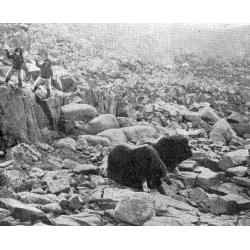
Cook devotes a considerable part of My Attainment of the Pole
and most of Return from the Pole to describing that
winter he spent with his two Inuit companions at Cape Sparbo. Cook
claimed that he was without civilized food or ammunition to obtain game
and survived only by reviving the techniques of the Stone Age hunter.
Many who have vehemently denied he reached the North Pole have been
willing to acknowledge his winter on Devon Island as one of the
greatest of all Arctic survival stories. But even this enthralling
story collapses upon analysis of Cook’s original diaries now
at the Library of Congress.
According to them, Cook arrived at
Sparbo with considerable food and ammunition, wintered in a snug
standard Inuit stone igloo in a far milder climate than northern
Greenland and was surrounded by ample game which he slaughtered at
will. Other important details of Cook’s narrative also suffer
on close analysis, though less so than Peary’s. One of the
chief jibes against Peary concerns the incredible speeds he claimed
during the unwitnessed part of his polar journey.  Cook’s, by comparison, look conservative, yet
Cook’s progress to the Pole, at an average of more than 15
miles a day is far faster than he, himself, estimated was possible
before he attempted it. No dog-sledge journey to the Pole, before or
since, even ones that were resupplied en route, and so did not need to
haul all its supplies from land to the Pole and back again, has ever
approached anything like it. In fact, until 1995, no surface expedition
(until that of Weber and Malakov)
Cook’s, by comparison, look conservative, yet
Cook’s progress to the Pole, at an average of more than 15
miles a day is far faster than he, himself, estimated was possible
before he attempted it. No dog-sledge journey to the Pole, before or
since, even ones that were resupplied en route, and so did not need to
haul all its supplies from land to the Pole and back again, has ever
approached anything like it. In fact, until 1995, no surface expedition
(until that of Weber and Malakov)   of any kind
reached the North Pole and returned to any point of land unresupplied
in any amount of time. Their accomplishment of this incredible physical
feat has never been given adequate recognition. of any kind
reached the North Pole and returned to any point of land unresupplied
in any amount of time. Their accomplishment of this incredible physical
feat has never been given adequate recognition.
|






 Cook’s, by comparison, look conservative, yet
Cook’s progress to the Pole, at an average of more than 15
miles a day is far faster than he, himself, estimated was possible
before he attempted it. No dog-sledge journey to the Pole, before or
since, even ones that were resupplied en route, and so did not need to
haul all its supplies from land to the Pole and back again, has ever
approached anything like it. In fact, until 1995, no surface expedition
(until that of Weber and Malakov)
Cook’s, by comparison, look conservative, yet
Cook’s progress to the Pole, at an average of more than 15
miles a day is far faster than he, himself, estimated was possible
before he attempted it. No dog-sledge journey to the Pole, before or
since, even ones that were resupplied en route, and so did not need to
haul all its supplies from land to the Pole and back again, has ever
approached anything like it. In fact, until 1995, no surface expedition
(until that of Weber and Malakov) 
 of any kind
reached the North Pole and returned to any point of land unresupplied
in any amount of time. Their accomplishment of this incredible physical
feat has never been given adequate recognition.
of any kind
reached the North Pole and returned to any point of land unresupplied
in any amount of time. Their accomplishment of this incredible physical
feat has never been given adequate recognition.